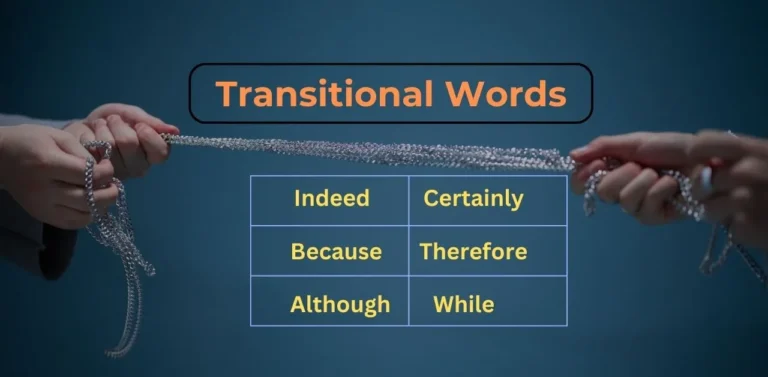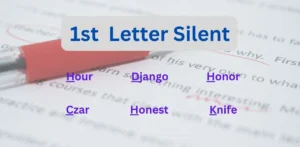When you’re writing an essay or any piece of text, have you ever noticed how some writers manage to make their ideas flow smoothly, like a calm river? Well, chances are they’re using something called transitional words.
Here are some common types of transitional words you can use to start paragraphs:
- Addition Words: Furthermore, Moreover, In addition, Additionally, Not only…but also…
- Contrast Words: However, On the other hand, Conversely, Although, While, Despite…
- Cause and Effect Words: Because, Therefore, Thus, As a result, Consequently, Hence…
- Example Words: For example, Such as, For instance, In particular, Specifically…
- Time and Sequence Words: First, Next, Meanwhile, Eventually, Before, Afterward…
- Emphasis Words: Indeed, Certainly, Without a doubt, Undoubtedly, Absolutely…
These little magical words might not seem like a big deal, but they play a crucial role in making your writing feel organized and easy to follow.
What are Transitional Words?
Transitional words, also known as transition words or linking words, are like the glue that holds your writing together. They act as bridges between sentences and paragraphs, guiding your readers through your ideas with grace.
Types of Transitional Words
Transitional words come in various flavors, each designed to serve a specific purpose in your writing.
By understanding the different types, you can strategically choose the right words to start your paragraphs and create a seamless flow of ideas. Here’s a closer look at each type:
1. Addition Words
Example Words: Furthermore, Moreover, In addition, Additionally, Not only…but also…
Purpose: These words are your go-to when you want to introduce more information that supports or extends your previous point.
They act as building blocks, adding layers of detail to your writing. Imagine you’re building a tower of blocks, and each addition word is like placing another block on top.
Example:
Original Sentence: The hike was breathtaking. The view from the top was astonishing.
With Transitional Words: Furthermore, the hike was breathtaking. Moreover, the view from the top was astonishing.
2. Contrast Words
Example Words: However, On the other hand, Conversely, Although, While, Despite…
Purpose: Contrast words help you show differences or present an opposing viewpoint. They’re like a spotlight that highlights the divergence between two ideas.
These words work wonders when you want to introduce a counterargument or provide balance to your writing.
Example:
Original Sentence: The weather forecast predicted rain all week. I decided to go camping anyway.
With Transitional Words: However, the weather forecast predicted rain all week. On the other hand, I decided to go camping anyway.
Related: Transition Words for CounterArgument
3. Cause and Effect Words
Example Words: Because, Therefore, Thus, As a result, Consequently, Hence…
Purpose: When you need to explain why something happened or the consequences of a particular action, cause-and-effect words are your pals. They establish a clear relationship between the events, guiding your readers through the logical chain of reasoning.
Example:
Original Sentence: She practiced the piano diligently. She won the music competition.
With Transitional Words: Because she practiced the piano diligently, she won the music competition. Therefore, she won the music competition.
4. Example Words
Example Words: For example, Such as, For instance, In particular, Specifically…
Purpose: Example words are like windows into your ideas. They provide specific instances or illustrations to support your claims. Think of them as evidence that makes your writing more concrete and relatable.
Example:
Original Sentence: Many countries are known for their iconic landmarks. France, for instance, has the Eiffel Tower.
With Transitional Words: For example, many countries are known for their iconic landmarks. Such as France, which has the Eiffel Tower.
5. Time and Sequence Words
Example Words: First, Next, Meanwhile, Eventually, Before, Afterward…
Purpose: Time and sequence words act like a roadmap, guiding your readers through the chronological order of events. They’re invaluable when you’re telling a story, explaining a process, or providing step-by-step instructions.
Example:
Original Sentence: I woke up early. I had to catch the first train.
With Transitional Words: First, I woke up early. Next, I had to catch the first train.
6. Emphasis Words
Example Words: Indeed, Certainly, Without a doubt, Undoubtedly, Absolutely…
Purpose: Sometimes, you really want to drive a point home. That’s where emphasis words come in. They add weight to your statements, leaving no room for doubt in your readers’ minds.
Example:
Original Sentence: The results of the experiment were accurate.
With Transitional Words: Indeed, the results of the experiment were accurate. Without a doubt, the results of the experiment were accurate.
Related Post: Powerful Words with Deep Meanings
Putting It All Together
Transitional words might seem like small details, but they pack a powerful punch when it comes to improving the flow and coherence of your writing.
By using the right type of transitional word at the start of each paragraph, you create a natural connection between your ideas, making it easier for your readers to follow along.



